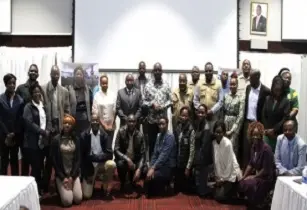The Food and Agriculture Organisation of the United Nations (FAO) and the Government of Zimbabwe recently launched a two-year Technical Cooperation Programme (TCP) to enhance fish breeding and production in the country
The TCP, which was developed in response to a request to the FAO by the Minister of Lands, Agriculture, Fisheries, Water and Rural Development, Dr A J Masuka last year, will alleviate the challenges currently faced by the fish farming sector concerning the availability of quality fingerling supply. The launch was attended by more than 60 key stakeholders in the fisheries and aquaculture value chain in Zimbabwe.
The project will enhance the capacity of government staff in tilapia hatchery management and the capacity of government hatchery facilities for production of high-quality fingerlings while reviewing and strengthening the hatchery management policy and legal framework. It will be implemented in line with National Development Strategy 1 and FAO’s Strategic Framework 2022-31, which seeks to support the 2030 Agenda through the transformation to more efficient, inclusive, resilient and sustainable agrifood systems for better production, better nutrition, a better environment, and a better life, leaving no one behind.
Key to sustainability is the modelling of the hatchery infrastructure design with the view of adaptability and replicability in other areas. The project will facilitate distribution of genetically selected breeds of high performance to arrest high demand and low supply of quality fingerlings in Zimbabwe. In addition, it will facilitate trainer capacitation, which is key to the success, continuity, and cascading of the project to farmers and promoting gender inclusivity by ensuring that women and youth are included in all layers of the value chain commencing with breeding and the supply chain.
“The FAO TCP programme will assist to strategically position hatcheries across the country to improve access and reduce the cost of fingerlings. As a Ministry, the thrust is to make use of aquaculture as business for youth, women, men and through such initiatives the country will soon be in a position to unlock the potential of our aquaculture sector,” said Deputy Minister of Lands, Agriculture, Fisheries, Water and Rural Development, Davis Marapira, in his official opening remarks of the launch.
In the near future, the project aims to establish three hatcheries that are expected to supply fish fingerlings to famers in Masvingo, Mashonaland Central and Matabeleland South provinces. The hatcheries are expected to supply more than 3.9 million fingerlings, thereby significantly increasing fish production output in the country and improving people’s livelihoods.
For more information, visit: https://www.fao.org/home/en





